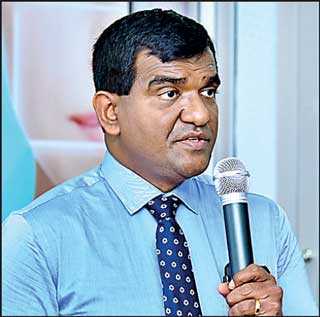Monday Feb 23, 2026
Monday Feb 23, 2026
Thursday, 14 November 2019 00:00 - - {{hitsCtrl.values.hits}}
Diabetes mellitus has become one of the biggest epidemics making all human beings across the world vulnerable. There are over 425 million people with diabetes across the world. This year’s theme for
 |
Senior Lecturer in Medicine, University of Colombo and Consultant Endocrinologist and Diabetologist, National Hospital of Sri Lanka Dr.Prasad Katulanda
|
World Diabetes Day is diabetes and your family. By this theme the importance of the involvement of the family in early detection, care and prevention is highlighted.
Diabetes which was mainly seen in the older adults is increasingly seen among the younger generations including children. A study carried out in 2018 has indicated that in Colombo district over 24% of adults have diabetes. This is a major increase compared to 18% which was seen in 2006.
The main risk factors for diabetes are obesity, unhealthy diet (diet rich in refined sugar, starch and fats) and physical inactivity.
As we know the strongest risk factors, we can prevent diabetes by avoiding these risk factors. In fact, 50% of the type 2 diabetes can be prevented by a healthy lifestyle.
Diabetes is diagnosed when fasting blood glucose is more than 126mg/dl. In the fasting blood glucose test when it is between 100-125mg/dl we call it pre-diabetes. The glycosylated haemoglobin test (HBA1C) which was earlier used to monitor long term blood glucose control is now used to diagnose diabetes. When HBA1C is above 6.5% we call it diabetes and when below 5.7% we consider normal. In between we consider pre-diabetes.
Those who have pre-diabetes have the highest risk of diabetes. Therefore, those with pre-diabetes needs to be more careful to prevent progression to diabetes and to attempt reversal to normal blood glucose levels. For screening blood tests for diabetes, it is very important to use laboratories with good standards.
Uncontrolled diabetes can lead to dreaded complications. These include kidney failure, blindness, amputations and heart attacks. Issues like sexual problems have become social problems.
Diabetes can be controlled by adopting healthy lifestyles and when necessary medications. By optimal glucose control one can prevent occurrence of complications and lead a normal life. For good control of diabetes medications alone is not sufficient. Good diet plan with the help of a dietician or nutritionist can be immensely helpful. Similarly physical activity when necessary with some guidance of a physical activity trainer can be useful.
CDEM provides comprehensive and multidisciplinary care for people with diabetes. Endocrinologists, cardiologists, nephrologists, neurologists, foot surgeons, eye specialists, dieticians, physiotherapists and educators work together provide holistic care for diabetes.
In the main CDEM centre at Norris Canal Road, Colombo 10 a special education program for World Diabetes Day will be launched by conducting a media briefing as well as free blood glucose testing on 14 November and very attractive screening packages between 14 to 31 November.
In addition, on 15 November a special screening and education program will be conducted at the Bambalapitiya branch of CDEM.
Blood glucose, blood pressure and BMI will be checked free and appropriate advice will be provided for the general public. This will be conducted on 15 November from 8 a.m. to 1 p.m. at CDEM Branch at No. 266 Galle Road, Bambalapitiya. A special education will be conducted at 2:30 p.m. by a specialist endocrinologist the same day.